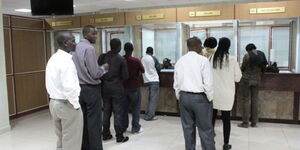The Affordable Housing Bill tabled before the National Assembly by Majority Leader Kimani Ichung'wah introduces four new features to the existing model that the High Court nullified.
Among the new provisions analysed by Kenyans.co.ke include the broadening of contributors, new powers for the Treasury Cabinet Secretary, penalty for late contributions and refund with interests as detailed below.
Broadening of Contributors
In the current model, only Kenyans who are employed face the 1.5 per cent salary deductions for the Housing Levy. This provision was questioned by the three-judge bench of Justices David Majanja, Christine Meoli, and Lawrence Mugambi, who averred that it was discriminatory.
Consequently, the new Bill now provides that Kenyans with an income will also be required to pay 1.5 per cent of their monthly earnings.
This will target those in the informal sector, mostly those doing business.
"The Levy shall be payable to the collector for remittance into the Fund, not later than the ninth working day after the end of the month in which the gross salary was due or gross income was received or accrued.
"An employer shall deduct and remit the amount referred to from the gross salary of an employee; and remit an amount equivalent to the amount deducted to the collector," proposes the Bill.
Exemptions
The Bill also seeks to give powers to the Treasury Cabinet Secretary to exclude some Kenyans from making contributions to the Fund.
"The Cabinet Secretary for the time being responsible for the National Treasury may, on the recommendation of the Cabinet Secretary, provide, by notice in the Gazette, that any income or class of income or any person or category of persons shall be exempt from the application on the imposition of the Housing Levy," read the Bill in part.
In this move, Kenyans with low income or those from vulnerable families may still be excluded from making contributions to the kitty.
This would be in line with the vision of Ruto who had indicated that the rich should make sacrifices to uplift the standards of those in the informal settlement.
Penalty for Late Payments
Kenyans and employers will also be penalised for late remittance of their contributions.
As per the guidelines, the contributions are expected to be made by the ninth of every month.
"Where an amount of the Levy remains unpaid after the date when it becomes due and payable by a person liable to remit the amount, a penalty equal to three per cent of the unpaid amount shall be due and payable for each month or part thereof that the amount remains unpaid and shall be summarily recovered as a civil debt from the person liable to remit the amount," the Bill proposed.
Refund With Interest
The Bill also provides that a person who contributes voluntarily to the Funds and fails to secure a house can get their withdrawals with interest.
Earlier, when the Housing plan was launched by the Ruto administration, Housing PS Charles Hinga had explained that the savings could be withdrawn. However, they would be taxed.
"An agency shall open a separate bank account where voluntary savings shall be kept, and any interest arising from the investment of voluntary savings shall be credited to this account. An agency shall issue an account number to each person making a voluntary saving.
"A person who has made a voluntary saving and has not been allocated an affordable housing unit and desires to withdraw his or her savings shall give a ninety-day notice to the agency for a refund with accrued interest, if any," read the Bill in part.












